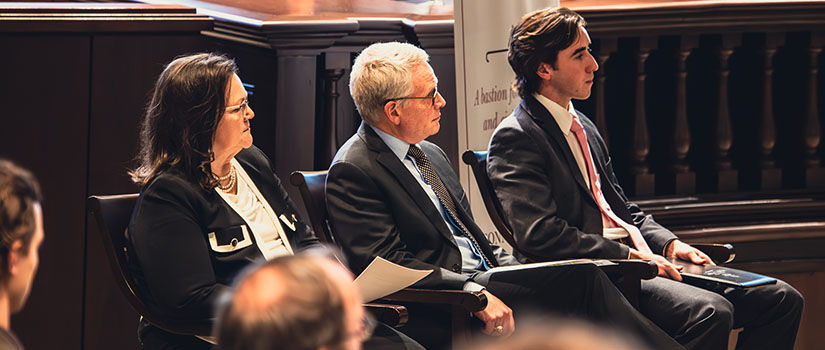The crowded auditorium is nearly silent, attention rapt on a single voice. From the podium, the speaker presents his argument with calm certainty, building his case fact by fact. But however incendiary segments of the crowd find his position, when time runs out, the only sound is applause.
As the audience settles, he takes his seat. His opponent stands with her counterpoints ready.
The Lincoln-Douglas Society debates cover controversial topics like abortion, hate speech and the death penalty. These events consistently draw large crowds, likely because of the subject matter. They also are consistently civil.
The turnout initially surprised society co-founders Carter Balderson and Cameron Cox, but the two University of South Carolina law students are pleased with the enthusiastic response.
“I made a joke at our last debate (in the spring) that it was wonderful that nobody had anything better to do on a Tuesday night,” Cox says. “I think our student body is impressive in that regard. They're attending intellectual discussions like they would a football game.”
Even before coming to law school, Balderson and Cox noticed a dearth of spaces for civil discourse. So, in their second year at the Joseph F. Rice School of Law, they established the first Lincoln-Douglas Society in the country.
Named for the historic Lincoln-Douglas debates of 1858, the society serves as a neutral platform for difficult conversations that might not otherwise happen. The goal isn’t necessarily to change peoples’ minds on a given issue, but to give people an opportunity to better understand the issues.
As the 3L co-founders explain, people tend to find themselves either in echo chambers where no one is challenged, or in unproductive arguments where participants are more likely to dig in their heels than listen to the opposition, if they engage in the first place.
Balderson and Cox insist the focus of the Lincoln-Douglas Society debates is the conflict between ideas, not people, and encourage attendees to come with an open mind.
In the anonymous polls they take before and after each debate, Balderson and Cox have seen at least a third of undecided attendees walk away with a more certain position and up to 10 percent of attendees flip to the other side of an issue.
“Some people say the debate didn't change their mind but now they understand the arguments,” Balderson says. “Or maybe they intuitively felt a particular way, but after listening they feel like they could explain to somebody why they think that way, which is just as valuable.”
Cox also points out that they poll attendees within minutes of the debate ending and posits that even people who leave with the same stance they came with may shift later as they continue to mull over the arguments.
And while the Lincoln-Douglas Society is a law student organization, around 15 percent of attendees are non-students, indicating that students aren’t the only ones who want to hear calm, well-reasoned arguments from both sides of an issue.
“We see ourselves as a bastion for free speech and civil discourse at the law school, but the Lincoln-Douglas Society isn’t just for students,” Cox says. “We want the society to be the modern public square for the whole state where these debates can get fleshed out.”
Society debates traditionally follow a 1-v-1 format, which allows for a clearer dialogue between point and counterpoint. They also employ a 3-v-3 approach, which offers varied perspectives and presentation styles.
When they started hosting Lincoln-Douglas Society debates, Balderson and Cox relied mainly on local and regional experts. As the society has grown in repute, they’ve worked to bring subject matter experts from farther afield.
Although they tend to come from legal backgrounds, the speakers represent a broad range of experiences from philosophy Ph.D. candidates to pastors.
Observing these debates gives attendees, and law students in particular, the chance to hear both sides of a well-reasoned and well-articulated argument. It’s an approach others want to replicate, including Cornell Law School, which is starting their own chapter of the Lincoln-Douglas Society.
Debate helps to cultivate invaluable lawyering skills like developing rational, creative, and persuasive arguments. Even students take the stage, giving the future lawyers an opportunity to not just observe, but further develop these skills themselves.
“Persuasion is an art... It's the ideas against each other, not the people,” Balderson says. “It's been great to see that people can maintain a high level of civility, because at the end of the day, we’re colleagues.”
